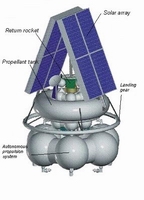Phobos-Grunt
The mission designed to study Mars from its orbit, the landing on its moon, Phobos, and the return of soil samples from Phobos back to Earth has been stalled by financial problems.

This missionís objectives are to collect soil samples from Phobos, a satellite of Mars and to bring the samples back to Earth for comprehensive scientific research into Phobos, Mars and Martian space. Studies would include:
* both in situ and remote studies of Phobos, including laboratory analysis of the soil samples
* monitoring the planet Mars, including the holistic dynamic behaviour of the atmosphere and dust storms
* studies of Martian surroundings, including plasma and dust components, and the radiation environment
On October 22, 2005, the Russian government signed decree No. 635, approving Federal Space Program for 2006-2015. It included funding for the Phobos-Grunt project, then slated for launch in October 2009 onboard the Soyuz-2 rocket.
http://www.sondasespaciales.com/modules.ph...rticle&sid=1632
http://www.esa.int/SPECIALS/ESA_Permanent_...IJFW4QWD_0.html
http://en.wikipedia.org/wiki/Phobos-Grunt
Rodolfo
